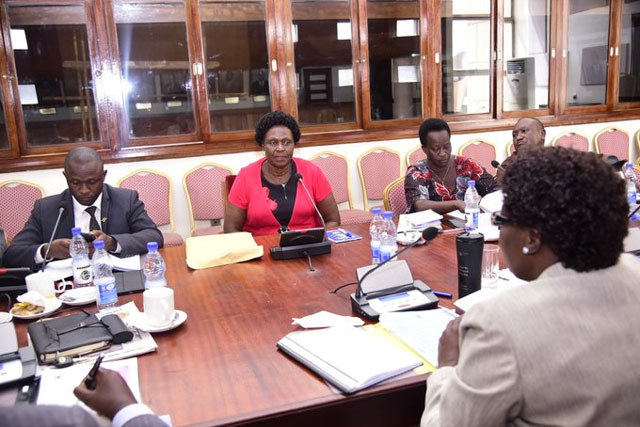
Kampala, Uganda | THE INDEPENDENT | The Constitutional Court has okayed the closed-door vetting of presidential nominees by the Appointments Committee of Parliament, saying it does not in any way affect the promotion of transparency and accountability. This was the unanimous decision of a panel of five Constitutional Court Justices comprising Deputy Chief Justice Richard Buteera, Catherine Bamugemereire, Muzamiru Mutangula Kibeedi, Irene Mulyagonja, and Monica Mugenyi.
The decision arises from a 2015 petition filed by Legal Brains Trust, a non-profit organization together with Journalists Simon Kagwa Njala and Sulaiman Kakaire against the Attorney General. The petitioners ran to court to interpret rule 153 (2) of the Procedure of Parliament 2012, which states that the proceedings of the Appointments Committee of Parliament shall be closed.
In their application, the petitioners argued that the said rule contravenes the Constitutional provisions that call for the promotion of transparency and accountability in all organs by the state by providing the public with timely, accessible, and accurate information. They noted that by failing to ensure that proceedings of the Appointments Committee of Parliament are generally open to the public and the press, and only held behind closed doors in exceptional circumstances permitted by the Constitution, the rule is unacceptable in a free and democratic society.
“The impugned rule conceals the process through which high-ranking public officials are sought, vetted and approved, and thus disempowers the public from effectively knowing about, scrutinizing and participating in the appointment of individuals who will make decisions affecting their rights contrary to Article 38 (1) of the Constitution,” they argued.
They asked the Court to declare the said Parliamentary rule inconsistent with the constitution and order Parliament to grant them access to any and all audio, video, and audio-visual recordings of the proceedings of the Appointments Committee that have been conducted by the Parliament since the coming into force of the impugned rule.
Through their lawyer Isaac Ssemakadde, the petitioners also asked the Court to issue a permanent injunction barring Parliament from enforcing the said rule or similar rules and regulations, which they said disproportionately conceal proceedings of the Appointments Committee. In response to the suit, the Attorney General through State Attorney Claire Kukunda asked the Court to dismiss the petition on grounds that the rule was put in place in line with the constitution to protect the right to privacy of those nominated.
Kukunda said there are a number of checks and balances that are put in place before an individual is sent to the Appointments Committee. For instance, for Judges, she said they are sent to the President for appointment on the recommendation of the Judicial Service Commission, as it is provided for in Article 142 of the Constitution.
As such, the government said it is farfetched to assume that the Appointments Committee requires the involvement of the public to ensure that there is no malpractice in appointments. She further explained that where a citizen questions the fitness of a candidate to appear before the Appointments Committee, for example on the basis of academic qualifications, there are steps that can be taken to challenge the same under the Access to Information Act.
In their judgment delivered Tuesday afternoon, the Justices concurred with the government that unrestricted sharing of personal information has been found to have a multitude of consequences and dangers to the individual whose information is publicized, which can be summarised as reputational damage, embarrassment 9t humiliation, emotional distress, identity theft or fraud, financial loss, physical harm, intimidation, discrimination and feelings of disempowerment.
“The impacts of the publication of a candidate’s personal information result from the fact that publication of such information may not be just about the plain facts disclosed; it could include the subjective opinions of the publishers that are not based on the facts. The information disclosed about candidates’ earnings or offices of profit, and as well as questioned qualifications, have the potential to attract salacious comments both from the press and consumers of ‘news,” wrote Mulyagonja in her lead judgment.
She went ahead to add that “this would not be only from the general public but also from political or potential political opponents, especially for the office of Cabinet Minister and ‘other minister whose candidates are not taken through any known selection process prior to appearing before the Committee.” According to the Justices, the salacious and subjective comments in the press may have a deleterious effect on the candidate’s reputation and future career prospects either as a politician and parliamentarian or even as a public officer.
The Justices noted that although there should be transparency and accountability, they had to weigh in bearing in mind the right to privacy of the presidential nominees. Counsel Stanley Okecho told Uganda Radio Network that he had been instructed by the petitioners to appeal the decision.
****
URN
 The Independent Uganda: You get the Truth we Pay the Price
The Independent Uganda: You get the Truth we Pay the Price



